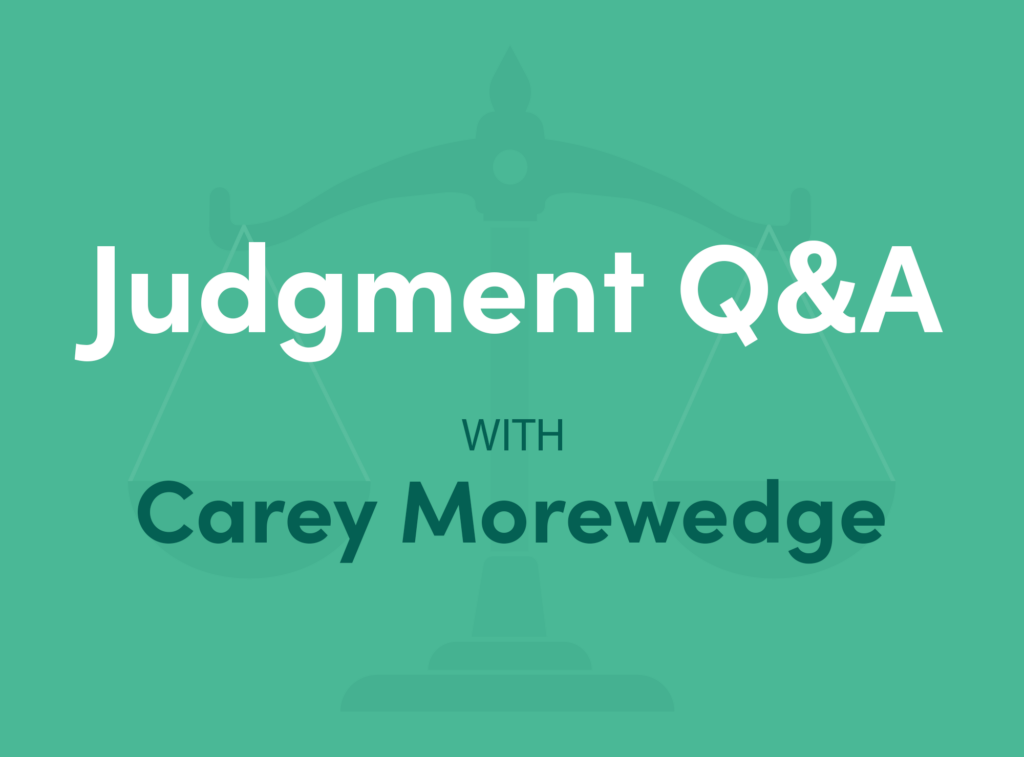
Carey Morewedge, a professor of marketing at Boston University’s Questrom School of Business, talked to us about how to cultivate judgment. Here are a few highlights:
What is judgment, and why is it important?
Judgment is getting as close as possible to the best answer. Everyone can have true and false beliefs about the world or calibrated and uncalibrated expectations. Part of our job as parents and teachers is to help kids figure out the difference. Kids have expectations about what will happen to them, and things may not turn out as expected. Say your kid comes home from school, and they think, “I failed that test.” You could ask them to think about how accurate their judgment might be: “What are the reasons why you think that’s true? Now, what are the reasons why it might not be true?”
How can people make better judgments?
To make an optimal judgment, you need to identify an objective function that you want to maximize and consider the variables involved. Let’s say you’re trying to choose a summer camp for your kid. Do you want to find the camp that will give them the best educational experience? That’s a different objective from trying to choose the camp they will enjoy the most. Then you have to consider all the differences between camps: Do they have different staff—say, college students versus adults? Do they do different kinds of activities? One might be STEAM-focused and another is more about the outdoors. How expensive are they?
But it’s usually not possible to think through every variable. Instead, people often take mental shortcuts to make the decision easier. Rather than research everything, you might base your judgment on the reputation of the school that the camp is held at rather than look at the curriculum. These shortcuts can be useful, but sometimes they lead us astray. Particularly consequential decisions—say, where your child goes to college—or ones that play out over and over again in a cumulative way, like what they eat for breakfast every day—those are the ones you’ll want to spend more effort on.
What’s a common mistake people make in judgment?
One big issue is confirmation bias. When making judgments, we tend to overweight information that confirms our beliefs. At the grocery store, I might try to decide whether a box of organic cereal is healthy or unhealthy. If I believe organic foods are healthy, I’ll tend to look for information on the box that suggests that the cereal is healthy (say, the fiber and protein content). And I’ll tend to overlook information that suggests the cereal is unhealthy (such as sugars and additives).
What’s the easiest way to help young people develop better judgment?
I think it’s useful to get kids to not just look for reasons why their idea is right. Push them to think about evidence for alternatives or reasons why their idea might be wrong. Help them think about questions such as Am I thinking about all the information available? What would suggest that this idea is wrong? Is there information that would refute the idea that I’m testing?
You could do this in your family when you’re thinking about issues together—have one person argue against whatever you’re suggesting. Kids like to do that. They’re contrarians by nature. Give them practice playing devil’s advocate with your ideas.
What’s a research finding you’re currently excited about?
We have some really cool data where we’re looking at expert decision makers and novices—the kinds of experts whose judgments drive what risks countries devote their budgets to prevent, like fires and floods. What we find is that these experts tend to be less biased both in the areas in which they achieve expertise and in similar kinds of problems in other areas. But the experts and novices both benefit from de-biasing strategies equally. This upends a lot of earlier work suggesting that the benefits of expertise are limited to the domain in which someone is an expert.
A big debate for the past 50 years is if judgment is a skill that can be improved, like algebra. Or if judgment is a perception that can’t be improved, like seeing the color green. Our data suggest there’s a lot of skill there. Knowing this makes me think we need to teach more people de-biasing strategies. Because if judgment is a skill, then learning how to do it better is good for people and good for the world.
